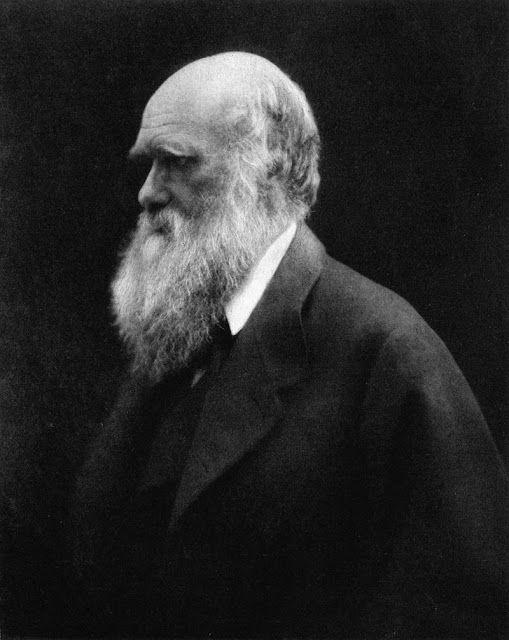Darwinism
Darwinism is a theory of biological evolution developed by the English naturalist Charles Darwin (1809–1882) and others, stating that all species of organisms arise and develop by natural selection of small, inherited variations that enhance the ability of individuals to compete, survive and reproduce. Also dubbed Darwinian theory, it originally covered broad conceptions of species transmutation or evolution that acquired universal scientific acceptance when Darwin published On the Origin of Species in 1859, incorporating concepts predating Darwin's theories. In April 1860, English biologist Thomas Henry Huxley coined Darwinism.
Terminological confusion
Darwinism subsequently referred to the specific notions of natural selection, Weismann barrier, or molecular biology's basic premise. While the phrase normally refers primarily to biological evolution, creationists have used it to refer to the genesis of life or cosmic evolution distinct from biological evolution. Therefore, instead of other conceptions, including divine design and extraterrestrial origins, the belief and acceptance of Darwin's and his predecessors' work is addressed.
In April 1860, English biologist Thomas Henry Huxley coined Darwinism.
Used in general to characterise evolutionary notions, including earlier concepts articulated by English philosopher Herbert Spencer. Many of Darwinism's proponents at the time, including Huxley, had misgivings about the relevance of natural selection, and Darwin himself credited what was eventually dubbed Lamarckism. August Weismann's stringent neo-Darwinism received few followers in the late 19th century. During the approximate era from the 1880s until roughly 1920, commonly called Darwinism's "eclipse," scientists postulated many alternative evolutionary mechanisms that finally proved unworkable. Early 20th century development of modern synthesis, merging natural selection with population genetics and mendelian genetics, revived Darwinism in an updated form.
While Darwinism remains in general use when referring to current evolutionary theory, science writers such as Olivia Judson, Eugenie Scott, and Carl Safina have increasingly argued that it is an inadequate name for modern evolutionary theory.
Darwin, for example, was unfamiliar with the work of the Moravian scientist and Augustinian priest Gregor Mendel, resulting in a confused and erroneous understanding of heredity. He naturally had no idea of later theoretical advancements and, like Mendel himself, understood nothing about genetic drift.
In the United States, creationists often use the term "Darwinism" as a pejorative term in reference to beliefs such as scientific materialism, but in the United Kingdom the term has no negative connotations, being freely used as a shorthand for the body of evolutionary theory and, in particular, with natural selection evolution.
Huxley and Kropotkin
At initially reading Darwin's idea in 1858, Huxley replied, "How extremely dumb not to think of it!" [
While the term Darwinism was previously used to refer to Erasmus Darwin's work in the late 18th century, the term as understood today was introduced when Thomas Henry Huxley reviewed Charles Darwin's 1859 book On the Origin of Species in the Westminster Review, April 1860.
Having hailed the book as "a true Whitworth weapon in the armoury of liberalism" promoting scientific naturalism over theology and praising the usefulness of Darwin's ideas while expressing professional reservations about Darwin's gradualism and doubting whether it could be proved that natural selection could form new species, Huxley compared Darwin's achievement to that of Nicolaus Copernicus i.
What if Darwinism's orbit should be too circular? What if species should give residual phenomena, not explainable by natural selection? Twenty years, therefore, naturalists may be able to decide whether or not this is the case; but either way they owe the author of "The Origin of Species" a great debt of gratitude.... And viewed as a whole, we do not believe that since the publication of Von Baer's "Researches on Development" thirty years ago, any work has appeared to exert such great influence, not only on the future of Biology, but in extending Science's dominance over regions of thought into which it has hardly penetrated.
- These are Darwin's basic principles of natural selection evolution:
- Each generation produces more individuals than can live.
- There is phenotypic variance among individuals and heritable variation.
- Those more environmentally-friendly individuals with heritable qualities will survive.
- When reproductive isolation occurs, new species forms.
Another major evolutionary theorist of the same period was the Russian geographer and famed anarchist Pyotr Kropotkin, who promoted a definition of Darwinism contrary to Huxley's in his book Mutual Aid: A Factor of Evolution (1902). His concept centred on what he viewed as the ubiquitous use of cooperation as a survival mechanism in human society and animals. He used biological and sociological considerations to suggest that the major factor in aiding evolution is cooperation among individuals in free-associated societies and organisations. This was to counterbalance the view of violent competition as the core of evolution, which offered an explanation for the dominant political, economic and social theories of the day; and the prevailing interpretations of Darwinism, such as those of Huxley, targeted by Kropotkin as an opponent. Kropotkin's view of Darwinism could be summarised as follows:
In the animal world, we have seen that the vast majority of species live in societies and find in association the best arms for the struggle for life: understood, of course, in its broad Darwinian sense—not as a struggle for pure means of existence, but as a struggle against all unfavourable natural conditions for the species. Animal species, where individual conflict has been reduced to its narrowest limits and where the practise of mutual assistance has achieved the greatest development, are generally the most numerous, the most affluent, and the most susceptible to further advancement. The reciprocal protection achieved in this circumstance, the possibility of reaching old age and amassing experience, greater intellectual development, and further growth of sociable behaviours, assure the species' maintenance, expansion, and further progressive evolution. Instead, unsociable creatures are condemned to decline.
Peter Kropotkin, Mutual Aid: Evolution Factor (1902), Conclusion



0 comments: